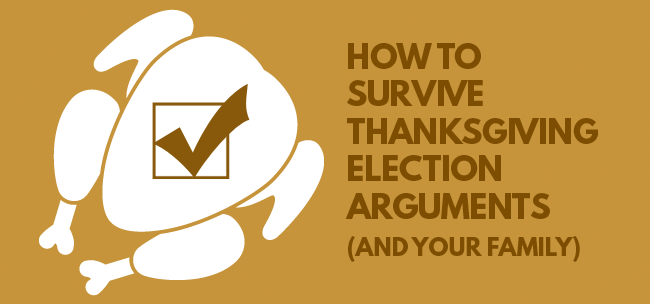
If you celebrate Thanksgiving, there’s a good chance you’ll be with family this weekend, sitting around for long periods of time, playing board games, watching TV, eating, and occasionally conversing. Though it breaks the Cardinal Rule of the Dinner Party, it’s almost guaranteed that one of your relatives (maybe even you) will mention the election. Political feuding is inevitable. You could start with something that really gets to the heart of the matter like, "Hey! It’s Thanksgiving! How about that history of colonialism!"
If this happens, and you want to remain on speaking terms with your elders/inlaws, we’ve pulled together some helpful talking points on a few contentious issues to get you through the main course.
 “Donald Trump’s got a point. You can’t say anything these days, with all this political correctness. We need someone to stand up for Canadian values. This hummus is delicious, by the way.”
“Donald Trump’s got a point. You can’t say anything these days, with all this political correctness. We need someone to stand up for Canadian values. This hummus is delicious, by the way.”
Did you know that everyone on Canadian soil, not just Canadian citizens, has fundamental freedoms (of conscience and religion, of thought, belief, opinion and expression), and that just because something someone does or says or wears makes you uncomfortable does not mean it should be prohibited? Sure these freedoms would have been unknown to the (somewhat religiously fundamentalist) pilgrims who celebrated the first Thanksgiving celebrations, but they are not “political correctness gone amok.” They are the foundations of liberty in all modern democracies, embraced by conservatives, liberals and progressives alike. Deal with it.
 “Kids today are so entitled. What do they call you now: milleniums? You want everything handed to you! Wait, are those yams?”
“Kids today are so entitled. What do they call you now: milleniums? You want everything handed to you! Wait, are those yams?”
Young people today have to work just as hard (or as long) as people did a generation ago. Minimum wage has not kept pace with inflation, so many workers are actually making comparatively less money. And higher education, which gets more expensive each year (tuition fees have tripled since 1993), is no longer considered a luxury, but rather a requirement for decent employment. Student debt is now on average $27,000 ($37,000 if you have private debt as well) for those graduating into a job market where youth unemployment is twice the national average. It’s taking longer for young workers, starting at much lower salaries, to achieve a living wage (known as “wage scarring”). Unpaid internships are all too common, while CEOs at Amazon expect their workers to put in 16-hour days if they really want to make it. And no, those are turnips.
 “Your aunt stayed home with her kids and didn’t expect someone else to raise them. Pass the potatoes.”
“Your aunt stayed home with her kids and didn’t expect someone else to raise them. Pass the potatoes.”
Families today are very different from the families of a generation ago. Both parents often work outside of the home both for financial reasons and for personal and professional fulfillment; and there are more single-parent families. This means that policies that once supported the traditional “dad works/mom stays home with the kids” model are no longer applicable. Current methods of family assistance—tax credits, income-splitting and poorly targeted monthly cheques—are not adequately supporting working families. In spite of decades of promises, we still don’t have a universal child care system in Canada, leaving over half a million children with two working parents and no child care space. Those lucky enough to find a spot can pay from $800-$1,000 each month (excluding Quebec)—more than rent for many people.
 “We’re being taxed to death! I’d rather have money in my pocket, than give it to the government. Mmmm…creamed corn.”
“We’re being taxed to death! I’d rather have money in my pocket, than give it to the government. Mmmm…creamed corn.”
First of all, corporate and personal tax rates in Canada have been steadily declining. Not coincidentally, public funding for the services we all depend on—like health care, education, public safety and income supports—has been cut, impacting service quality. If federal taxes were what they were in 2000, the government would have brought in $50 billion more this year, and there would have been no need for the cuts to veterans, food safety, affordable housing and federal libraries just so the government could balance the books. Meanwhile, Canada’s wealthiest are stashing more money than ever outside the country in tax havens in Bermuda, Luxemburg and Ireland—about $200 billion worth. If those people paid their fair share of taxes, think of the kinds of public services we might be able to pay for, and how that would take the pressure off our wallets.
 “I’ll tell you what: people today just don’t understand the meaning of hard work. Can I get some more cranberry sauce over here?”
“I’ll tell you what: people today just don’t understand the meaning of hard work. Can I get some more cranberry sauce over here?”
Let me be clear (!): people are working harder than they ever have, in an attempt to offset stagnant incomes, rising user fees, and trying to save for an unpredictable future. Poverty is stubbornly persistent. The employment rate has not budged since the 2009 recession, meaning any decrease in unemployment is as a result of people who have given up looking for work. And the jobs that have returned are largely precarious and part-time—in fact, underemployed and marginally attached workers now outnumber unemployed workers (in far greater proportion among new immigrants and First Nations, it must be added). One in four Canadians say they are living paycheque to paycheque (other surveys suggest the ratio is even higher). Currently there are six unemployed workers for every job vacancy. Some of the more back-breaking work is done by temporary migrant workers with few of the rights granted to naturalized citizens. And our EI system is not keeping pace with today’s job market, where 20% of jobs are part time and 14% are seasonal. The problem is not that people “don’t want” to work. The problem is that there are not enough jobs—and certainly not enough full-time, steady jobs—for workers.
With any luck, these talking points will help you make it through dinner, dispel a few common myths about inequality, taxation, social programs and “values,” and spark a discussion about the policies that make us—collectively—more resilient and engaged as citizens and voters.
Now, pass the pumpkin pie, please.
Erika Shaker is the CCPA’s Education Director. Follow Erika on Twitter @ErikaShaker.
The author would like to thank Stuart Trew, CCPA's Senior Editor for his many contributions to this article. Follow Stuart on Twitter @StuJT.






